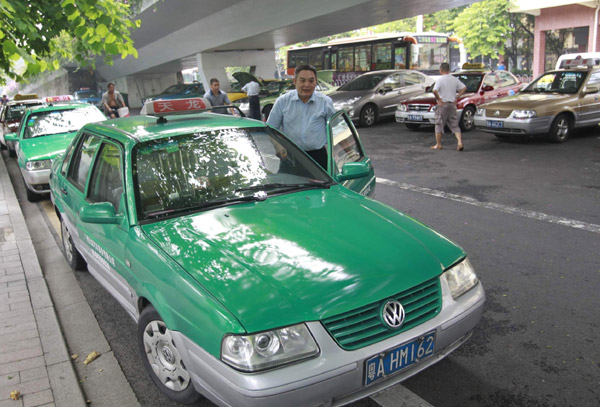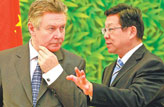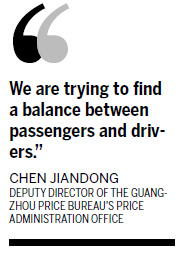Economy
Proposals to link fares to fuel prices
Updated: 2011-07-19 07:45
By Qiu Quanlin (China Daily)
GUANGZHOU - A public hearing on two proposals meant to link taxi fares to fuel prices took place on Monday amid a rise in the pressure on the taxi industry in this southern metropolis.
 |
|
Traffic authority in Guangzhou, capital of South China's Guangdong province, is considering raising taxi fares in response to soaring oil prices. Zou Zhongpin / China Daily |
"Both proposals are aimed at establishing a link to fuel prices to replace the current additional-fuel charge and ease the increasing pressures being placed on drivers and passengers," said Chen Jiandong, deputy director of the Guangzhou Price Bureau's price administration office.
The first proposal would increase the basic fare all cab passengers pay for traveling up to 2.3 km from 7 yuan to 9 yuan, while the amount charged for each subsequent kilometer would remain at 2.6 yuan.
|
|
In a surprise step on Monday, the local price authority proposed lowering the percentage used to calculate the additional fares cab drivers can charge during nights shifts, taking it from 30 percent, which is now charged between 10 pm and 6 am, to 15 percent, which would be charged from midnight to 6 am.
"The original time - 10 pm - is not in accordance with the real travel situation in Guangzhou," Chen said. "And the 30 percent additional charge is too high."
The proposal would also increase the idling time charge - imposed when a cab is stuck in traffic - from 26 yuan an hour to 31 yuan an hour, and the highest speed at which a cab can be considered to be idling would go from 10 km an hour to 12 km an hour.
The minimum fare would go up or down by a yuan when the price of liquefied petroleum gas - the fuel for many cabs - fluctuates by 0.83 yuan a liter, and the standard would be 4.5 yuan a liter.
Cab fares would also increase by 50 percent above their original total on trips that run for more than 35 km.
Another proposal would increase the starting charge to 10 yuan for up to 2.5 km and set the standard price of liquefied petroleum gas at 4.8 yuan a liter.
If the local government approves either proposal, that would mean the current 2-yuan additional fuel charge would be canceled.
"The hearing is not all about the taxi price hike," Chen said. "We are trying to find a balance between passengers and drivers."
The hearing on Monday was attended by 25 representatives from various walks of life, including taxi drivers and residents. Of them, only two favored the first proposal, saying that the starting charge and additional charge it calls for will help reduce the differences seen between the incomes brought home by drivers who work day shifts and those who work nights.
Twenty-one of the representatives, a majority, were in favor of the second proposal, saying that its relatively simple charging system would prove easier for passengers and drivers to understand.
Zhong Guoquan, who has been driving in the city for 13 years, said: "Traffic jams on busy roads during rush hours have affected our business. So I suggested that the charge for idling time be increased."
The remaining two participants said both proposals should be amended since they would raise prices and place more financial burdens on passengers.
The hearing's results will be subject to approval from the city government in the next 15 days.
Sources within the price authority said the second proposal will not be the final plan, even though a majority of representatives agreed with it at the hearing on Monday.
"We need time to assess all opinions and decide on a final arrangement," Chen said.
By the end of 2010, Guangzhou had about 38,000 cab drivers, and they had signed operation contracts with 66 taxi companies, sources with the Guangzhou Taxi Association said.
The price adjustment in Guangzhou followed on similar adjustments in Beijing and Shanghai, which increased fares in April and July respectively.

Specials

China-US Governors Forum
The first China-US Governors Forum is held July 15 in the Salt Lake City, the United States.

My China story
Foreign readers are invited to share your China stories.

Rare earths export quota
China kept its export quota at almost the same level as last year.
